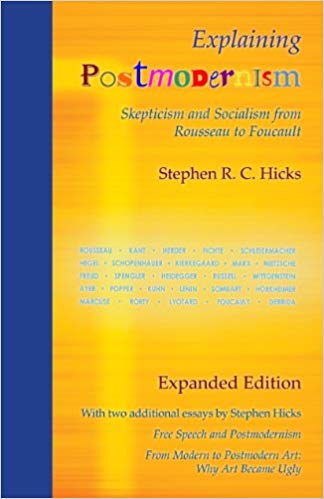Explaining Postmodernism Audiobook (Online) by Stephen R. C. Hicks
Explaining Postmodernism Audiobook by Stephen R. C. Hicks

Explaining Postmodernism Audiobook by Stephen R. C. Hicks
Stephen Hicks has actually composed a trenchant as well as likewise fascinating magazine on an important topic, yet I undertake this evaluation with aversion. Explaining Postmodernism Audiobook by Stephen R. C. Hicks Download. I might launch versus myself that direst of all destinies for a customer– a wealth of crucial letters. The element for my fear will certainly arise later, yet to protect thriller I will certainly handle some designs in overview out of the order in which the author has actually positioned them.
As befits a wonderful thinker, Hicks educates us precisely what he suggests by postmodernism: “Metaphysically, post-modernism is anti-realist, holding that it is difficult to chat meaningfully regarding an individually existing reality. Postmodernism replaces instead a social-linguistic, constructionist account of fact. Epistemologically, having decreased the principle of an individually existing reality, postmodernism rejects that element or any kind of various other approach is a method of obtaining straight know-how of that fact … Postmodern accounts of mankind are continually collectivist, holding that people’ identifications are created mainly by the social-linguistic teams they belong of … postmodern designs in worths in addition to national politics are recognized by an acknowledgment with as well as likewise compassion for the groups regarded to be suppressed in the disputes, in addition to a decision to get in the fight royal on their part” (pp. 6– 7, focus in initial).
That advertises this variety of odd sights? Hicks educates us that the “names of the postmodern lead are presently acquainted: Michel Foucault, Jacques Derrida, Jean-François Lyotard, as well as Richard Rorty. They are its top organizers” (p. 1). Hicks in addition states another group of “accustomed in addition to normally notorious names” that helps the lead. He appropriately includes on his checklist the feminist thinker Luce Irigaray; yet, unlike our author, her specialized is not “the argument of scientific research” (p. 2).
Hicks does not devote much space to an extensive account of the various postmodernists he explains; he devotes his major emphasis to a basic depiction of the task as well as likewise an account of its thoughtful ancestry. He does give an exceptional brief conversation of Derrida, for whom there is definitely nothing previous language. “Language connects just with much more language, never ever before with a non-linguistic fact. In Jacques Derrida’s words,’ [t] he fact of language is potentially the only reality to take on all parenthization.’ That is to state, we can not obtain past language” (p. 175). In other places he promotes “Derrida’s ‘crossing-out’ tool of making use of a word yet after that the crossing it bent on recommend that its usage is ironical” (p. 73).
Behind Derrida exists Martin Heidegger, as well as Hicks uses an outstanding evaluation of this substantially significant thinker.” [L] ike all outstanding German thinkers, Heidegger agreed that when we get to the core of Being we will certainly find conflict in addition to opposition at the heart of factors … Heidegger’s diversity was his use phenomenology … equally as well as plainly defining the experiences of experience as well as likewise alteration. On Heidegger’s account, what one finds when starting so is a sensation of projection right into a location of experience as well as likewise modification. Do not think items, Heidegger counsels, think locations. Do not assume subject, think experience” (pp. 59– 60).
This brand-new kind of presuming tested standard reasoning in addition to thinking “as just one surface area perspective– one that the Greeks had really developed fatefully for all doing well Western suggestion” (pp. 62– 63). Instead, we ought to search for Being by means of “an exploratory releasing right into the revelatory sensations of monotony, problem, embarassment, as well as likewise are afraid” (p. 63).
As will absolutely be presently recognizable, Hicks does not count on exaggeration; as well as likewise at one consider his discussion of Foucault, he goes also much. Explaining Postmodernism Audio Book Stream. He declares that “Foucault prolongs his wish for effacement to the whole human varieties. At the end of The Order of Points, he chats practically longingly regarding the coming erasure of the human race. Man is ‘an innovation of current day’ that will absolutely swiftly ‘be eliminated, like a face drew in sand next to the sea'” (p. 195).
Hicks has right below had a look at Foucault uncharitably. When Foucault anticipates “completion of guy,” he does not suggest that all humans will swiftly encounter elimination. Instead, he anticipates completion of a details understanding of man– about, a fertilization based upon a global humanity. The fertilization worried had, in Foucault’s view, a specific beginning in time; in addition to, similarly as humans long preceded this fertilizing, so they could be prepared for to proceed afterwards.
.
.